|
Introduction
and Page 1 /
2 /
3 /
4 /
5 /
6 /
7 /
8 /
9 /
10 /
11 /
12 /
13 /
14 /
15 /
16 /
17 /
18 /
19 /
20 /
21 /
22 /
23 /
24 /
25 /
26 /
27 /
28 /
29 /
30 /
31 /
32 /
33 /
34 /
35 /
36 /
37 /
38 /
39 /
40 /
41 /
42 /
43 /
44 /
45 /
46 /
47 /
48 /
49 /
50 /
51 /
52 /
53 /
54 /
55 /
56 /
57 /
58 /
59 /
60 /
61 /
62 /
63 /
64 /
65 /
66 /
67 /
68 /
69 /
70 /
71 /
72 /
73 /
74 /
75 /
76 /
77 /
78 /
79 /
80 /
81 /
82 /
83 /
84 /
85 /
86 /
87 /
88 /
89 /
90 /
91 /
92 /
93 /
94 /
95 /
96 /
97 /
98 /
99 /
100 /
101 /
102 /
103 /
104 /
105 /
106 /
107 /
108 /
109 /
110 /
111 /
112 /
113 /
114 /
115 /
116 /
117 /
118 /
119 /
120 /
121 /
122
78
< Page 79 < 80
Ray Carney's Mailbag -- This section of the site contains letters written to Prof. Carney by students and artists, announcements of news, events, and screenings, and miscellaneous observations about life and art by Ray Carney. Letters and notices submitted by readers are in black. Prof. Carney's responses, observations, and recommendations are in blue. Note that Prof. Carney receives many more letters and announcements than he can possibly include on the site. The material on these pages has been selected as being that which will be the most interesting, inspiring, useful, or informative to site readers. Click on the first page (via the links at the top or bottom of the page)
to read an explanation of this material, why it is being posted, and how this relatively small selection was made from among the tens of thousands of messages Prof. Carney has received.
Click
here for best printing of text
Professor Carney,
I hope this letter finds you and yours in good health and high spirits.
My name is Christopher Moore, 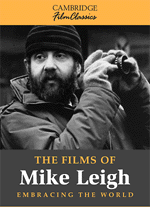 and I am the producer and co-director of a
new documentary film on Hugo Chavez and his campaign for re-election in
Venezuela. I am writing you today because I would love to arrange a
screening of this film at Boston University. I am currently putting
togethera "tour" of New England schools, and I would love for BU to be a
key stop on the schedule. and I am the producer and co-director of a
new documentary film on Hugo Chavez and his campaign for re-election in
Venezuela. I am writing you today because I would love to arrange a
screening of this film at Boston University. I am currently putting
togethera "tour" of New England schools, and I would love for BU to be a
key stop on the schedule.
I graduated from Trinity College, in Hartford, CT, in the spring of 2006.
At this time, I formed an independent documentary film company, Sol
Productions, with two fellow Trinity graduates. Over the last year, we
produced and directed two major documentary films, "Puedo Hablar? / May I
Speak?", the film on Venezuela, and "Democracy in Dakar", which chronicled
the role of hip-hop music in Senegalese politics.
We spent two months in Venezuela filming "Puedo Hablar? / May I Speak?",
following both candidates as they raced towards the December 3rd
elections. The film offers its audience a snapshot portrait of a
Venezuelan society at a crossroads; a re-elected president, challenged by
a mounting opposition. Our team traveled to six different regions of
Venezuela, filming everywhere from the notorious barrios of Caracas to the
oil-rich Lake Maracaibo, from a city of five million to an Amazonian
pueblo of twenty-three, traveling in everything from Chavista motocicletas
to dug-out canoes to a private jet.
The trailer for the film is available online at this link:
www.brightcove.com/channel.jsp?channel=932890796
Last spring, we hosted a number of "tester" screenings of rough drafts at
schools such as Trinity and Sarah Lawrence College, and the response was
wonderful. A man as outspoken and influential as Hugo Chavez attracts
quite a crowd, and the question-and-answer period that followed each
screening was electric. We have met many college students around the globe
while filming, and they all comment that it is encouraging to see American
students graduating and pursuing influence in the world. I have no doubt
that a screening would generate similar sentiment on your campus.
I hope that we might arrange something at BU.
Again, I hope this finds you well, and I look forward to hearing from you
soon.
Sincerely,
Chris Moore
Christopher Moore
Sol Productions, Inc.
www.sol-productions.org
www.democracyindakar.com
RC replies:
I'll recommend your film, but bear in mind that I am a minority of one and don't have the final say. Please be forewarned that my department and college are extremely conservative politically, and even more conservative intellectually. It's a legacy of thirty years of academic and administrative appointments by an extremely conservative university administration. Change--in a university, in a corporation, in a government, in the world--is glacially slow--if it takes place at all--in the absence of a Hugo Chavez to energize and lead it. But I shall make a strong recommendation. All best wishes. RC
An excerpt from a letter to me from regular site reader and correspondent, Donal Foreman in Ireland. The attendance figures refer to the John Cassavetes retrospective recently held at London's BFI Southbank Theatre. (Click here to read an announcement about it being done "on the cheap.") Another discouraging demonstration that if you don't have a personal appearance by a big name movie star or movie star director (as Michael Moore has worked to turn himself into), or a big, fake, mass of journalistic hype to promote an event, people just don't bother attending. A Cassavetes retrospective gets "20-25 viewers at most." We are too intellectually and emotionally lazy to interest ourselves in anything less sensationalistic than Paris Hilton's discharge from jail. What is the world coming to? Or am I the dreamer? Has it always been this way? -- R.C.
Hi Ray,
... I thought you might be interested to know I was in London last week and attended some of the Cassavetes films at the NFT. The turnouts weren't great (20-25 people at most) but the prints were surprisingly good and those that did show up seemed to be appreciative. Strangely the Rossellini films they were showing were much better attended despite being a lot more difficult and inaccessible to watch (have you seen his later films---CARTESIUS, PASCAL, ACTS OF THE APOSTLES, etc? What do you think?) Maybe their historical content attracted a certain crowd, or Rossellini just has a better rep?
Dublin is also getting a Cassavetes retrospective next month and, miraculously, we're showing far more of his work than London (usually we just get the NFT's leftovers)---even HUSBANDS, LOVE STREAMS, MIKEY & NICKY.... I'll let you know how that all goes.
---Donal
Subject: I came across this today
RC,
I'm reviewing this ridiculous book about the Holocaust and horror movies for a journal. I was talking about with a friend, complaining I guess, wondering if they will actually publish what I have to say about it. He reminded me that exposition upon insignificant minutia is precisely what academics are in the business of writing, and that sent me racing to find a passage I had read about a year ago - some very eloquent words I thought would be a nice intro to my review. It seems like it would fit nicely on one of your lists of quotes as well. As you often suggest, just change a couple words, and it speaks directly to us film-studying types. I would say, substitute "film studies" for "philosophy" and "America" for "Germany."
From William James' A Pluralistic Universe:
In a subject like philosophy it is really fatal to lose connection with the open air of human nature, and to think in terms of shop-tradition only. In Germany the forms are so professionalized that anybody who has gained a teaching chair and written a book, however distorted and eccentric, has the legal right to figure in the history of the subject like a fly in amber. All later comers have the duty of quoting him and measuring their opinions with his opinion. Such are the rules of the professional game - they think and write from each other and for each other and at each other exclusively. With this exclusion of the open air all true perspective gets lost, extremes and oddities count as much as sanities, and command the same attention.
(Collected Writings 1902-1910, Library of America, p. 638).
He wrote that a hundred years ago! So much for the good old days when scholars were working on real spiritual and intellectual problems for the benefit of their fellow human beings. I guess the more things change the more they stay the same, and other clichés.
best wishes,
dj
A note from Ray Carney (and a response to Dan Jones's preceding letter):
I am currently reading two amazing books I wanted to recommend to site visitors. The first is a collection of Hector Berlioz's letters: Selected Letters of Berlioz, ed. by Hugh Macdonald (W.W. Norton, 1997). It is some of the most sensitive, perceptive music and art criticism ever written. If you don't already know all about Berlioz, you should begin with his Mémoirs, a book I sometimes give to the best film production students as a graduation present. It is one of the greatest autobiographies ever written, ranking with Constantin Stanislavki's My Life in Art as an account of what it is really like to be an artist -- the dedication, the discipline, and the sacrifice involved; the doubts, despairs, and frustrations of the path; and the wonders, mysteries, and ecstasies of the calling.
 The other book is one of the grimmest and most terrifying I have ever read, but all the more needed and necessary for that reason: Jonathan Glover, Humanity: A Moral History of the Twentieth Century (Yale University Press, 2000). To adapt a blurb I read about it: There have been many histories of the twentieth century that tell the story in terms of economics, politics, sociology, ideology, or some other fashionable -ology or -ism, but this is the first book that views history, and the history of our lives and of the past 100 years, in terms of a series of moral (and immoral) choices, moral (and immoral) decisions, moral (and immoral) social structures and organizations of knowledge. Glover surveys many of the key events and turning points in the history of the past 100 years -- from trench warfare in World War I, to Stalin's reign of terror in Russia, to the first use of atomic weapons in World War II by the United States, to Hitler's and Mao's regimes--and asks what these people, these events, and these social movements can tell us about the moral life of the planet at this point in time. How could such events take place? How could such social organizations develop? How could millions of individuals cooperate in creating them, collaborate in playing a role within them, or, at the very least, let them happen, afraid of resisting them or speaking out against them? Glover paints a bleak picture. But its bleakness resides (to my mind) less in the fact that approximately twenty percent of humanity are apparently almost completely amoral and willing to do virtually anything to further their own power and position, than in the fact that eighty percent of humanity are willing to carry out the orders of that twenty percent, are willing to let the twenty percent have their way, willing to look the other way and remain silent in the face of unthinkable, unspeakable, unimaginable cruelty and atrocity. We want to imagine the terrorists and supporters of terrorists are elsewhere, but Glover shows us that they are right here and now in our midsts -- that they are all around us and that we (or the vast majority of us), our friends, our neighbors, our relatives, and our co-workers and colleagues are willing to collaborate with them or acquiesce in their acts of terror. It is a blood-chilling recognition, and an almost unbelievable one, but as Glover surveys the history of the past 100 years--in great care and detail, quoting memos from scientists working to develop the U.S. and German atomic bombs, statements by doctors working in Hitler's Third Reich, and the accounts of peasants faithfully helping to further Mao's Cultural Revolution or Pol Pot's urban evacuations and "cultural cleansings" in Cambodia, it is hard to come to any other conclusion. The other book is one of the grimmest and most terrifying I have ever read, but all the more needed and necessary for that reason: Jonathan Glover, Humanity: A Moral History of the Twentieth Century (Yale University Press, 2000). To adapt a blurb I read about it: There have been many histories of the twentieth century that tell the story in terms of economics, politics, sociology, ideology, or some other fashionable -ology or -ism, but this is the first book that views history, and the history of our lives and of the past 100 years, in terms of a series of moral (and immoral) choices, moral (and immoral) decisions, moral (and immoral) social structures and organizations of knowledge. Glover surveys many of the key events and turning points in the history of the past 100 years -- from trench warfare in World War I, to Stalin's reign of terror in Russia, to the first use of atomic weapons in World War II by the United States, to Hitler's and Mao's regimes--and asks what these people, these events, and these social movements can tell us about the moral life of the planet at this point in time. How could such events take place? How could such social organizations develop? How could millions of individuals cooperate in creating them, collaborate in playing a role within them, or, at the very least, let them happen, afraid of resisting them or speaking out against them? Glover paints a bleak picture. But its bleakness resides (to my mind) less in the fact that approximately twenty percent of humanity are apparently almost completely amoral and willing to do virtually anything to further their own power and position, than in the fact that eighty percent of humanity are willing to carry out the orders of that twenty percent, are willing to let the twenty percent have their way, willing to look the other way and remain silent in the face of unthinkable, unspeakable, unimaginable cruelty and atrocity. We want to imagine the terrorists and supporters of terrorists are elsewhere, but Glover shows us that they are right here and now in our midsts -- that they are all around us and that we (or the vast majority of us), our friends, our neighbors, our relatives, and our co-workers and colleagues are willing to collaborate with them or acquiesce in their acts of terror. It is a blood-chilling recognition, and an almost unbelievable one, but as Glover surveys the history of the past 100 years--in great care and detail, quoting memos from scientists working to develop the U.S. and German atomic bombs, statements by doctors working in Hitler's Third Reich, and the accounts of peasants faithfully helping to further Mao's Cultural Revolution or Pol Pot's urban evacuations and "cultural cleansings" in Cambodia, it is hard to come to any other conclusion.
In a strange way, Glover's insight ties in with the point Dan Jones makes in the preceding letter and the points that I have made on preceding pages of the Mailbag about the emotional failures and moral abdications of modernist aesthetics and formalist critical methods. Glover is a philosopher, and he takes philosophers (with a few exceptions) to task for having had almost nothing to say about these events as they transpired, and having had little or no effect on them. The philosophers were busy doing "linguistic philosophy" or "analytic philosophy" while Mao and Pol Pot were merrily going about their work. The philosophers were busy writing their footnoted articles and struggling to get promoted while Hitler and Stalin were establishing their death camps.
 In a similar vein, we might ask (as Dan Jones implicitly does when he quotes William James above) where are the film scholars, the film critics, the filmmakers, the television producers while George Bush currently goes about his merry, immoral way? Are there really only a handful of morally courageous individuals alive at any moment in a culture? One or two or three percent perhaps, vastly out-numbered (and surely outgunned and outmaneuvered) by the sociopathic twenty percent and the acquiescent, look-the-other-way eighty percent? Where are the physicists and engineers willing to say no to George Bush's ABM missile plans? Where are philosophers, critics, and historians who are not content merely to climb the academic ladder, who are willing to speak truth to power, even if it means being denied a grant or not getting tenure? Where is our morality? -- R.C. In a similar vein, we might ask (as Dan Jones implicitly does when he quotes William James above) where are the film scholars, the film critics, the filmmakers, the television producers while George Bush currently goes about his merry, immoral way? Are there really only a handful of morally courageous individuals alive at any moment in a culture? One or two or three percent perhaps, vastly out-numbered (and surely outgunned and outmaneuvered) by the sociopathic twenty percent and the acquiescent, look-the-other-way eighty percent? Where are the physicists and engineers willing to say no to George Bush's ABM missile plans? Where are philosophers, critics, and historians who are not content merely to climb the academic ladder, who are willing to speak truth to power, even if it means being denied a grant or not getting tenure? Where is our morality? -- R.C.
Ray,
I was at a coffee shop pounding away on my latest script in University City, Mo. when I saw the film "Killer of Sheep" would be playing the next day and actress Kaycee Moore would be appearing with it. I saw the movie and was fascinated by it's depiction of real people struggling with life. This picture was not a combination of real life picked up by Hollywood fantasy. I had seen Charles Burnett's "To Sleep With Anger," a more well known film. I would have never known about this type of filmmaking had I not read the writings of Ray Carney. When I was growing up, I thought Lucas, DePalma, Kubrick and Spielberg represented all that was good in cinema. I also enjoyed your essay on the independent narrative tradition. Have you ever thought to doing an essay on the experimental tradition? I feel that Maya Deren is another neglected name in cinema history.
Jason Sibert
 RC replies: Agreed about the work of Charles B (a good guy and a good friend). Yes, Maya Deren's work is interesting. But I have my row to hoe. My own personal task to perform. There isalready a small but committed group of critics and scholars (e.g. P. Adams Sitney, Scott MacDonald, David James, et alia) devoted to helping and celebrating and calling attention to non-narrative (avant-garde) filmmaking, while the ultra-low budget indies have very few critical champions. (Yes, there are some stalwart programmers and curators who show their work, but there are still darn few serious, academic, scholarly critics who understand it and really try to help them.) So that is the task I was given by life. I must use my talent to do the greatest possible good in the time available. That's what life asks of us. I must not waste it. Look up the word "talent" in the Bible. Just as every horn player only has so many Brandenburg 2s in him, so every writer only has so many books in him and so many opportunities to speak and help others. So many eggs number a life. We must not squander what we have. We must use each opportunity with total love and commitment, and we must carefully choose where to put our love and commitment or we will squander them. RC replies: Agreed about the work of Charles B (a good guy and a good friend). Yes, Maya Deren's work is interesting. But I have my row to hoe. My own personal task to perform. There isalready a small but committed group of critics and scholars (e.g. P. Adams Sitney, Scott MacDonald, David James, et alia) devoted to helping and celebrating and calling attention to non-narrative (avant-garde) filmmaking, while the ultra-low budget indies have very few critical champions. (Yes, there are some stalwart programmers and curators who show their work, but there are still darn few serious, academic, scholarly critics who understand it and really try to help them.) So that is the task I was given by life. I must use my talent to do the greatest possible good in the time available. That's what life asks of us. I must not waste it. Look up the word "talent" in the Bible. Just as every horn player only has so many Brandenburg 2s in him, so every writer only has so many books in him and so many opportunities to speak and help others. So many eggs number a life. We must not squander what we have. We must use each opportunity with total love and commitment, and we must carefully choose where to put our love and commitment or we will squander them.
And about writing about the "experimental tradition"--I'll have you know that EVERY great work of art is an experimental work!! Only junk food is made from recipes. To be an artist is to dare all, to dare to go into the unknown, to dare to fail, to be an experimenter every time out. Anything else is mass-production and capitalism and making products to sell. Everything I am interested in is "experimental" art. --R.C.
Subject: Seymour Slive quote
RC,
Too funny! While reading about Seymour Slive (from your mailbag recs), I ran across this great quote: "Although a specialist himself, Slive encouraged broad knowledge, remarking on occasion that 'only donkeys have fields.' " Slive sounds like you!
Marty
A note from Ray Carney: The following letter continues the discussion of what makes a movie good (or bad) that begins on page 67 of the Mailbag and continues for the next five or six pages after that. (These pages are accessible via the blue menus at the top and bottom of each Mailbag page.) I invite responses from other readers. -- R.C.
Subject: debating the function of art
Ray,
I saw your call-to-arms, in many ways, for people to start defining what art is and what its function should be, and I figured that I would weigh in with my own ideas on art.
I am a student in New York City, preparing to graduate with a major in Education Studies, with a deep desire to make films, perform music, write stories, engage in political activism -- anything to move people in some way out of their apathy, whether it is an apathy aimed at their own inner lives or the lives of others around them. With that profound urge to do something, I have tried to study the artists that have moved me in some way to better myself, to engage my imaginative powers to reach higher and higher ground, to take the long and painful steps necessary to actually reach that higher ground I set for myself. In those studies, and in contemplating my own creations, I have taken the lesson that Cassavetes' father gave to his son to heart -- namely, that art as a public expression is a big responsibility, both to one's self and to one's audience, and it is not something to be misused and abused.
With that lesson in mind, it is always surprising, no matter how often repeated, to hear artists reflect on their art as something that is non-suggestive, something that is merely formalistic, something that is not intended to create movement and disturbance, to put things in a temporary flux. It is even more of a shock to hear artists claim that they are not responsible for their artistic work, neither responsible to themselves nor to their audience. The kind of art that is advocated in those instances is something much worse than merely "elite" art for "elites" -- it is empty art for empty people.
I recall hearing one of the great black writers and activists of this century, Amiri Baraka, speak of the continuous tension between form and content. As Baraka said, if you're a formalist, and you think form is more important than content, then you can "dig" Riefenstahl's "Triumph of the Will" and Griffith's "Birth of a Nation" as great artistic works, despite the fact that one is a recruitment flick for Nazism and the other for the Ku Klux Klan. The fact of the matter goes deeper, too, because to love those two films, one has to be completely ignorant of the social consequences of a work of art. Right and wrong, good and bad, moral and immoral, are inconsequential terms in that view of art. You can say, "Wow, look at Leni's editing, it's incredible," while glancing over the stature she builds to Hitler in the film.
Just as you have written in your books, and just as the greatest of artists have created in their works, art has to be a living and breathing thing, here and now. When you watch a great film, you should feel the soft heat of its breath on the back of your neck; your hair should stand on edge; sweat should accumulate on your brow; you should feel uncomfortable, unsettled, wondering how you can make it through this picture. Art should disturb us, bring chaos into our inner lives, create that temporary flux inside of us, challenge us to become better than we are right now. Art is responsible to its audience, and more importantly, responsible to an ideal of a better world. It should make its audience carriers of that ideal, getting them to work for it for real.
These are things that I carry with me as I am preparing to start creating my own works of art. Films, novels, music live inside of me now, spurring me to advance and go for broke. Those things are a real live art, not a decaying beauty.
Tyler Cullis
RC replies: Thanks, Tyler. My comments (and Dan Jones's citation from William James) above on this page about 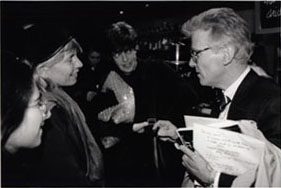 critical formalism and philosophical modernism, about the way philosophers and critics have walled off their own inquiries and the works they examine from the world are relevant to your point. But you cite two overly easy examples when you call for a "non-formalistic" art. It's too easy to pick on critics and viewers who celebrate the style of Triumph of the Will or Birth of a Nation. And there aren't many of these kind of critics and viewers anyway. What about the millions of critics and viewers who admire the work of Quentin Tarantino? Of Joel and Ethan Coen? Of Steven Spielberg? Of Oliver Stone? Of Guy Maddin? Of George Lucas? Who admire a series like The Sopranos? Or burn incense to Francis Coppola's Godfather films? (The Godfather was recently voted by the morally corrupt and intellectually bankrupt American Film Institute one of the "ten best films ever made." That's the kind of opinion your tax dollars are paying for.) I myself have MAJOR moral and ethical problems with those works and the work of those filmmakers (and a hundred other critically celebrated and academically revered works and directors). You have to deal with that. You need to think about it. critical formalism and philosophical modernism, about the way philosophers and critics have walled off their own inquiries and the works they examine from the world are relevant to your point. But you cite two overly easy examples when you call for a "non-formalistic" art. It's too easy to pick on critics and viewers who celebrate the style of Triumph of the Will or Birth of a Nation. And there aren't many of these kind of critics and viewers anyway. What about the millions of critics and viewers who admire the work of Quentin Tarantino? Of Joel and Ethan Coen? Of Steven Spielberg? Of Oliver Stone? Of Guy Maddin? Of George Lucas? Who admire a series like The Sopranos? Or burn incense to Francis Coppola's Godfather films? (The Godfather was recently voted by the morally corrupt and intellectually bankrupt American Film Institute one of the "ten best films ever made." That's the kind of opinion your tax dollars are paying for.) I myself have MAJOR moral and ethical problems with those works and the work of those filmmakers (and a hundred other critically celebrated and academically revered works and directors). You have to deal with that. You need to think about it.
In other words, how do you deal with the moral failures of work that doesn't have obvious racism or xenophobia in it? How do you deal with the moral abdications of the critics and viewers who celebrate these works? Explaining that is the task you should set for yourself. That would make a difference. Attacking Riefenstahl and  Griffith is shooting fish in a barrel. Go after the contemporary immoralists in our culture, the ones the critics still celebrateand the immorality no one seems to detect. The contemporary propagandists for greed. The contemporary promoters of sensationalism and spectacle. The contemporary apologists for imperialism. The contemporary high priests of capitalist competitiveness and selfishness. Hindsight, as they say, is twenty-twenty. It's easy to condemn the past for being stupid, but what about the present? We're just as stupid (and immoral), but of course we don't see it. That's the way all tribal culture works. If you don't understand that, read the book I recommend above on this page by Jonathan Glover (Humanity: A Moral History of the Twentieth Century). He explains this very clearly. He shows how culture always hides the immorality of the present from view. He shows how it prevents us from seeing what is right in front of our eyes. That's what earth's tribal and national and linguistic groupings do. That's where the work needs to be done. Griffith is shooting fish in a barrel. Go after the contemporary immoralists in our culture, the ones the critics still celebrateand the immorality no one seems to detect. The contemporary propagandists for greed. The contemporary promoters of sensationalism and spectacle. The contemporary apologists for imperialism. The contemporary high priests of capitalist competitiveness and selfishness. Hindsight, as they say, is twenty-twenty. It's easy to condemn the past for being stupid, but what about the present? We're just as stupid (and immoral), but of course we don't see it. That's the way all tribal culture works. If you don't understand that, read the book I recommend above on this page by Jonathan Glover (Humanity: A Moral History of the Twentieth Century). He explains this very clearly. He shows how culture always hides the immorality of the present from view. He shows how it prevents us from seeing what is right in front of our eyes. That's what earth's tribal and national and linguistic groupings do. That's where the work needs to be done.
And there is another very important additional point to take into consideration. "Moral art" is not ultimately about promoting politically correct views and understandings. That's not enough. That may be an improvement on promoting racist and xenophobic views, but in the end it is just to promote another limiting way of understanding. Art can do more than that. It can be more radical than that. It can free us from ALL FIXED VIEWS. It can be a mode of liberation from all limited tribal understandings -- political or cultural. This is a hard thing for most people to understand, and, in fact, I'm not sure that there is a single reviewer or critic in America who understands it. The imagination is a force in the world too. A crucial force. The imagination matters. Art is not merely a form of sociology. Art is not merely another form of social work and affirmative action for minorities and oppressed groups. (And it is not very good at accomplishing those functions anyway.) In affecting our imaginations, art can change the world much more deeply and radically than those forms of knowledge can. I invite other comments from readers. -- R.C.
Dear Prof. Carney,
We met briefly at last night's screening of "Team Picture" at the Harvard Film Archive - I'm an incoming freshman at BU enrolled in the UNI program and hoping to get involved in the film program. I was delighted to see you at my first visit to the HFA - I wish we could have talked for longer because I have so many questions about the film and the series. While I enjoyed "Team Picture," I felt that it lacked the charm that gives Andrew Bujalski's films their fingerprints (not to judge Kentucker Audley's film solely on how it measures up to AB's work). Curiously, I felt that the film's strongest moment was the sequence in which the main character wandered around Chicago with his part-time crush - the only scene, according to director, that was improvised and not scripted. Why are so many of today's indie filmmakers drawn to this style of filmmaking, and influenced by Cassavetes in particular over any other American independent filmmaker? Moreover, in our short conversation, you said that some of the recent "mumblecore" films (for lack of a better term) have their moments while others do not - what makes these moments? Are they anchored by improv?
Peripherally, as I write this I'm poking through the recommended viewing page of your website and I'm happy to see Paul Morissey's name - I recently watched "Trash" and have not laughed as hard since.
Best,
Josh Horwitz
A reply from Ray Carney: Good to see you at the "under the radar" festival. Some amazing works, some really truly world-changing works showing there. I'll turn your questions to me back on you. Ponder what "charm" means and why you want it in a film. Ponder its influence on our culture -- a culture of "charming" politicians, charming movie stars, charming houses and neighborhoods. Or if you don't mean "charm," then try to articulate what you do mean. Ponder what happens when you categorize works into genres like "mumblecore" or "navel-staring" films. What have you done to the works? What have you done to your experience? My students are constantly doing this. Many teachers do this. They love categories. They love groupings. What happens when you group things together this way? What happens when you walk through a museum and say that this painting is "color field," this one is "cubististic," this other one is "abstract expressionism?" What have you done to the work of the artist? How have you limited it? How have you misunderstood it? Struggle for verbal consciousness. Language is a machine for thinking. Of course, these matters lend themselves better to conversation than they do to email. Come see me in my office some time and we can talk. All best wishes. -- R.C.
Hey Ray-
How are you? I've been back and forth between Philly and NYC the last few months trying to make a living. I just saw "Tickets" by Olmi/Kiarostami/Loach. I really loved it. Small acts of kindness are explosions of love and compassion. I'm considering joining a Monastary for a few months, hopefully Zen Mountain Monastary, but I'm still not sure of what to do. I just finished a 2 minute short--a musical collage about what has been going on on the inside. "I just can't hide it". Haven't really done anything like it before. Don't know if you can watch youtube:
http://www.youtube.com/watch?v=sS_pZ16bLhY
Hope all is well,
Lucas
PS I blew through the book "Zen Master Who" which is a tad gossipy really but a nice overview of American Zen.
Subject: Frownland
Mr. Ray Carney,
Hey man. I just wanted to drop you a line before Sunday's screening (Click here to read about the screening of Frownland and other low-budget indie films that Bronstein is referring to) and thank you for programming my film. Frownland was recently described in one review as "a film nearly as brave to program as it is to make" and while the word "brave" probably wouldn't make it onto a list of top 10,000 adjectives to describe my personality, i thought it was a pretty funny assessment nonetheless.
And, shit, the particular slant you took in the synopsis you composed for the program was real rewarding. When making the film i actively groped to puncture the way neurosis is commonly represented in movies....as something sort of attractive or funny or quirky or harmlessly nebbishy or eccentric...which belies the sort of knee-jerk antipathy that real neurosis catalyzes in people who come into contact with it. I don't know. There's a certain type of person out there...one that we're all familiar with...who provokes a kind of instant instinctive repulsion in nearly everyone they cross paths with. You run into these 'off' people now and again and it's the social equivalent of pushing two magnets towards one another. By way of example, it's the kind of person who might stop you on the street and ask you for directions and before you know it you're claiming that you don't know the way...even though you do....just to end the exchange as quickly as possible. In life, it's just so easy to dismiss people like this. They don't occupy enough real estate in your brain to force you to confront and reasonably gauge whether this instinctive aversion is justified. You simply go about your business and push them out of your mind as quickly as they entered into it. I guess i figured a movie theatre, where people are willing to be held captive for a few hours, is a good environment to make audiences spend time with someone like this, chew em over, swallow em, regurgitate em, chew some more, etc...and hopefully arrive at a more layered response. At the root, it's a pretty unnerving process to undergo i guess....and one that has made plenty of viewers real angry. At the character, at the film, at me and at whoever the hell selected to screen it!!! Heh. So maybe that's what the critic meant with the line that i quoted at the start of the email.
So yeah, what i'm trying to say is... thanks man. Hopefully we'll get a chance to meet on Sunday.
Ronald Bronstein
RC replies: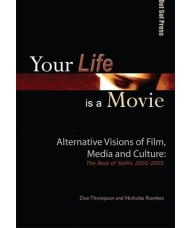
Subject: The misfit/the loner/the loser within all of us
Ronald,
Thanks for the thanks, but I should be thanking you for making such a great work. Thank you!
I'll be at the screening on Sunday to introduce the film and you, and you'll have time to field questions and comments from the audience.
Keep making trouble! It's the only way to go.
Ray
P.S. And -- if you can accept a friendly amendment: I refuse, refuse, refuse to see your film as the portrait of a "neurotic" or "nebbish" or whatever. He's me. He's you. He's the person sitting next to us, or your main character is nothing. It's just that it's hard to see ourselves as we really are, in our hearts and souls, I mean. But that's precisely why art exists. To show us the bugs under the carpet. The weave, the knots, the loose ends on the other side of the rug. The truths we repress and deny. That's what art is. That's why we need it. Everything else is television. And advertising. And PR. And bullshit.
Ronald Bronstein replies:
Right on man. I certainly don't mean to imply that i see Keith as something 'other' or alien to me. No way. I mean, I put so much of myself...and the crummy discomfiture that I felt all through my 20's...into that character. To the point that i was originally going to play him myself. But as i got closer to making the thing, i came to believe that i needed a much more intense and severe version of my own vexation to sort of shake people out of their comfort zones. Thankfully, I ran into Dore Mann (Keith) at just the right time. At a family funeral no less.
Speaking of which...i just got word from Dore that he's going to come with me to Harvard for the post screening discussion. Which is a real boon given his abject unwillingness to take part in any of the screenings to date. Could be interesting.
Anyway, really looking forward to the trip...
Ronald
RC replies:
Great news!!!! Bring anyone and everyone you want to. We'll have a great time and all go out and party or whatever you want to do afterwards.
Ray
A note from Ray Carney:
2 AM
July 5, 2007
I just had my world rocked by a work of art. It has happened to me once in a while in the past -- with Tarkovsky's The Sacrifice, Cassavetes' Faces, Balanchine's Jewels and Swan Lake, Linda Ronstadt's La Boheme, E. Power Bigg's organ concerts --but it doesn't happen often.Years can pass between artistic experiences this intense. The work of 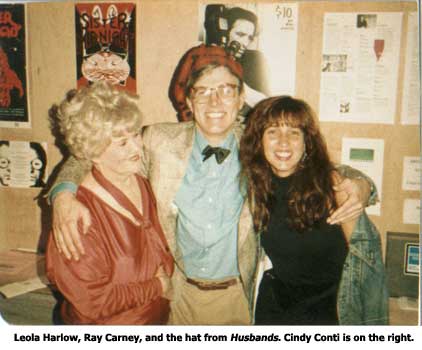 art was a film by David Ball, called Honey, and it screened in the "new indie films" series I put together for the Harvard Film Archive. (Click here to read more about Ball's film and the entire series.) Needless to say, since I programmed it, I had seen the movie before. But that was a scratchy videotape copy on a tiny television screen at home in my living room. This time was a digital copy, projected on a gigantic screen, in a movie theater, with an audience -- the way movies are meant to be seen. The effect was devastating, emotionally speaking. The film destroyed me. I could hardly catch my breath during the screening, things were happening so rapidly, so dangerously, so thrillingly, so scarily. At the end, as the credits rolled, I sagged back in my seat, feeling beat-up, drained, worn-out, worked-over -- and deeply moved and affected by what I had just lived through. It was the way you feel after you have survived a life-changing experience. Wiped out and exhilarated in the same breath. The way the greatest art always affects a viewer or listener. It takes away everything we thought we knew and propels us on an experience we could never have even imagined before we lived through it. It takes us on a wild roller-coaster ride of confused feelings and disorganized thoughts that may require hours or even days to be processed and assimilated. Honey is that good. David Ball has created one of the great contemporary works of art. art was a film by David Ball, called Honey, and it screened in the "new indie films" series I put together for the Harvard Film Archive. (Click here to read more about Ball's film and the entire series.) Needless to say, since I programmed it, I had seen the movie before. But that was a scratchy videotape copy on a tiny television screen at home in my living room. This time was a digital copy, projected on a gigantic screen, in a movie theater, with an audience -- the way movies are meant to be seen. The effect was devastating, emotionally speaking. The film destroyed me. I could hardly catch my breath during the screening, things were happening so rapidly, so dangerously, so thrillingly, so scarily. At the end, as the credits rolled, I sagged back in my seat, feeling beat-up, drained, worn-out, worked-over -- and deeply moved and affected by what I had just lived through. It was the way you feel after you have survived a life-changing experience. Wiped out and exhilarated in the same breath. The way the greatest art always affects a viewer or listener. It takes away everything we thought we knew and propels us on an experience we could never have even imagined before we lived through it. It takes us on a wild roller-coaster ride of confused feelings and disorganized thoughts that may require hours or even days to be processed and assimilated. Honey is that good. David Ball has created one of the great contemporary works of art.
I would call Honey the best film of the year or the best film of the past five years -- except for the fact that Ball's movie was completed seven or eight years ago and still has not found a distributor.Last night's screening was, in effect, its world premiere. How can that be? Is it really the case that the greater the work (the more original, the more unclassifiable, the moreemotionally and intellectually daring), the harder it is to persuade anyone to release it? Well, that's the way it seems to be, at least in this case.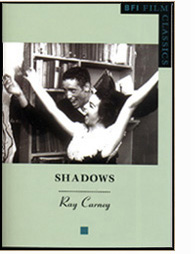
A side note: the audience for the Harvard Film Archive screening consisted of fewer than fifteen people. The rest were out watching the Fourth of July Fireworks in the Boston Harbor. They had no idea that the real fireworks were taking place on the screen at the Carpenter Center. By the time it was over, Honey had left scorch marks on the ceiling. And in our souls. Thank you, David Ball.
A second, related note from Ray Carney: I sent the preceding to David Ball to use on his web site and to thank him for his work. A brief excerpt from his reply to follows. I print it as an encouragement to all of the filmmakers out there who are in his shoes, still seeking a distributor or a major screening venue. You are not alone. Don't give up. Keep working. Keep making movies. -- R.C.
Dear Ray--
Thank YOU for the Harvard event. Really, it was the highlight of my year. As I told you at dinner, everything leading up to the locked picture was as fulfilling artistically as it could possibly be, and everything thereafter was extremely frustrating, but this was, in many respects, my plan--to tie myself to the mast and make a movie that I wanted and needed to make, without considering how crushing it was going to be to deal with the film industry. So the Harvard screening was, more than anything, an incredibly healing time--to see the movie with you, my favorite critic and the leading writer on my favorite filmmaker, really made it all worth it. I made Honey for people like you, and to have my ideal audience respond to it--let's just say that quality can trump quantity, American consumerist culture be damned. Or, in the words of one of my favorite folk singers Roger Manning (himself now without a label, designing websites): to be really appreciated is to be really appreciated by the really appreciated......
DB
Subject: Letter from a German fan
Dear Mr. Carney,
my name is Carsten Czarnecki and I'm an aspiring filmmaker from Munich (you must've read that kind of sentence a few thousand times already). I have already contacted you before and you sent me a nicely signed copy of "The Adventure of Insecurity". And as I have told you before, you have been my greatest inspiration and influence among writers about cinema. Your books on Cassavetes, Dreyer, Capra as well as other writing and even interviews have provided me with the perfect kind of soul-food that I needed for my art-loving heart. I admire you tremendously and wish to have your immense writing skills and intelligence one day.
As to the concern of this email: I am going on a vacation to New York this August and wanted to ask whether it would be possible to meet you. I know that it may be a little unusual to be asked such a thing, but because of my enormous admiration for your work I would really love to meet you one day and have a talk. It would mean very much to me. Please tell me if that would be OK for you. I hope you don't mind being addressed that directly.
Anyway, I look forward to hear from you and wish you all the best there is.
Carsten Czarnecki
 Dear Carsten, Dear Carsten,
Thanks for the kind words. Your words are too kind and your opinion of me is wildly inflated (I'm a very fallible, very imperfect, totally ordinary human being), but I thank you for your words and am deeply moved that my work has been of any use or inspiration.
As to a visit in New York (or Boston): I regret to say that it will not be possible.Please forgive me, but I have put in something like three hundred hours of work preparing for and presiding over the independent film festival (the "under the radar festival--the best of the "unknown, forgotten, lost, or unreleased films" series) and simply need a break to restore and renew myself. I am headed up to Vermont to spend time reading, writing, and listening to tender Mozart and spiritual Bach, and shall be away when you are in the United States. Please don't take my inability to see you personally. I am a mere mortal (as much as I may want to deny it), and desperately need to recharge my batteries and reflect and restore myself. I shall be away until classes resume in late August or early September.
All best wishes in your life and work.
Cordially,
Ray Carney
78
< Page 79 < 80
Introduction
and Page 1 /
2 /
3 /
4 /
5 /
6 /
7 /
8 /
9 /
10 /
11 /
12 /
13 /
14 /
15 /
16 /
17 /
18 /
19 /
20 /
21 /
22 /
23 /
24 /
25 /
26 /
27 /
28 /
29 /
30 /
31 /
32 /
33 /
34 /
35 /
36 /
37 /
38 /
39 /
40 /
41 /
42 /
43 /
44 /
45 /
46 /
47 /
48 /
49 /
50 /
51 /
52 /
53 /
54 /
55 /
56 /
57 /
58 /
59 /
60 /
61 /
62 /
63 /
64 /
65 /
66 /
67 /
68 /
69 /
70 /
71 /
72 /
73 /
74 /
75 /
76 /
77 /
78 /
79 /
80 /
81 /
82 /
83 /
84 /
85 /
86 /
87 /
88 /
89 /
90 /
91 /
92 /
93 /
94 /
95 /
96 /
97 /
98 /
99 /
100 /
101 /
102 /
103 /
104 /
105 /
106 /
107 /
108 /
109 /
110 /
111 /
112 /
113 /
114 /
115 /
116 /
117 /
118 /
119 /
120 /
121 /
122
|










